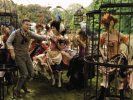Eye For Film >> Movies >> The Magic Flute (2006) Film Review
After a few quiet years (in cinema terms, at least) Kenneth Branagh is back with a vengeance. This autumn has seen three films directed by him released in quick succession and next year he’ll be one of the Brit Thesps supporting Tom Cruise in Bryan Singer’s Valkyrie.
It’s fair to say, however, that his return hasn’t exactly been warmly welcomed so far. The Japanese-themed version of As You Like It received lukewarm reviews and a blink-and-you-probably-missed it release, while his helming of the Pinter-scripted ‘reimagining’ of Sleuth achieved the impressive feat of uniting virtually the entire critical community in derision.

So is the final entry in the cycle worth a look – a version of a 200-year-old opera with a plot ludicrous even by the standards of the genre, translated into English and set in a stylised, pastel-shaded version of the muddy carnage that was World War One? My answer would be emphatically yes, if you believe in the power of cinema to transport you to a different world, and make one of the classic works of a ‘difficult’ and ‘elitist’ art form accessible to everyone.
Branagh achieves this by playing to his strengths. Let’s face it, was he the best person to direct a cold, claustrophobic two-hander about male power games? He’s always worked best when given an epic canvas (Henry V and Hamlet), or an unashamedly romantic plot (Much Ado About Nothing). Here he has both, and he goes to town on them. Orson Welles may have thought a film studio was the best train set a boy could ever have, but for Ken it’s a bumper box of toy soldiers, an Edwardian model theatre and a picture book of the English countryside.
That’s where the film opens, with a sweeping shot of green fields suddenly subverted as a soldier’s haned reaches out from a trench to pick a flower (a shot reminiscent of All Quiet On The Western Front, and the first of many nods to the Golden Age of Hollywood).
The camera then pans back to reveal mile upon mile of trenches, teeming with soldiers making ready for an attack. They wear the familiar uniform of 1916 Tommies, but in a vivid shade of blue. Their opponents across no-man’s land are in equally surreal and homogenous red. Behind them are massed ranks of field guns and above, squadrons of biplanes.
It’s all CGI, of course, and where that sense of unreality normally jars, here it perfectly suits Branagh’s desire to homage classic melodramas such as Wings or The Dawn Patrol, and create a world in which elemental ideas like duty and loyalty are about to be put to the test.
The attack is a slaughter, but in the midst of it a young officer in the blue corner called Tamino (Joseph Kaiser) is knocked unconscious by a shell blast. A trail of mustard gas creeps towards him (the ‘serpent’ of Mozart’s original) but he is rescued by three mysterious ladies, appearing first as nuns from a local cloister, then transforming into three very sexy-looking nursing auxiliaries.
They are the handmaidens of the Queen of the Night (Lyubov Petrova), who makes a dramatic entrance atop a tank and sets Tamino a task in return for saving his life. Her daughter Pamina (Amy Carson) is being held prisoner by the evil Sarastro, leader of the red faction. She shows Tamino a picture of the beautiful maiden and he immediately falls in love (imagining himself dancing with her in a black and-white dream sequence straight out of an MGM musical) and resolves to undertake the quest.
Aided only by a comic sidekick, Papageno (Ben Davis), and the titular bit of enchanted woodwind, he sets out for Sarastro’s fortress, brilliantly imagined as a monolithic chateau, where shell-shocked officers scream ‘go back!’ and ‘Dulce et Decorum Est...’ is carved above the gates.
But when Tamino encounters Sarastro himself (Rene Pape), he finds not a diabolical tyrant but a humane, enlightened despot seeking to rid the land of the scourge of warfare. Tamino can do this by proving his love for Pamina, but to do that he must be tested. And the Queen of the Night is far from happy at his change of heart...
Stephen Fry’s English libretto copes pretty well with the many silly twists and turns of the story, giving some suitably dark and subtle edges where needed while never losing sight of the fact that this is basically a love story with a happy ending. Some of the rhyming couplets are a bit lame, but no worse than the average English National Opera translation, and he largely manages to avoid the bathetic "are you going? Yes, I’m going" excesses that bedevil opera in English.
The cast are all well-chosen, veterans of opera and musical theatre with the exception of newcomer Carson who copes well in pretty exalted company (Pape and Petrova, in particular, have opera pedigrees as long as your arm, and it shows). Branagh resists the temptation to shoehorn old mates like Brian Blessed into the cast, the only vaguely ‘gimmicky’ role being Liz Smith (Nana in The Royle Family) who appears as an old crone whom Papageno must learn to genuinely love in order to achieve the same happiness and redemption as his master.
Not one to convert the Branaghphobes, then, and definitely not for anyone wandering round the multiplex having just missed the first five minutes of Hitman. But if you want glorious music played and sung by performers who really know their stuff, give it a try. It’s a bit kitsch and over the top, but in a good way. And if you can’t eat a whole tin of Quality Street at Christmas, when can you?
Reviewed on: 01 Dec 2007




















